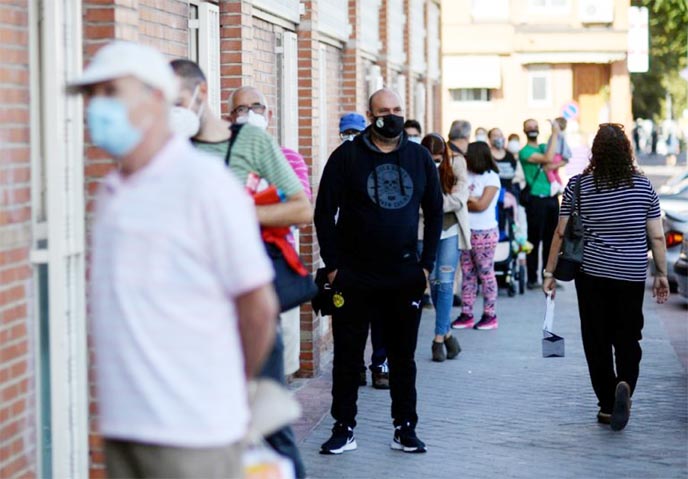
Reuters, Madrid :
Spain’s Madrid region on Wednesday requested urgent help to hire hundreds of foreign doctors and reinforce police as they registered 1,290 new coronavirus infections and considered extending a partial lockdown to more areas.
Representing over a quarter of Spain’s 4,143 new cases in the past 24 hours, the capital region has been hardest hit by a second wave of COVID-19, with the number of daily deaths and infections soaring to levels not seen since May.
Madrid has already restricted movement between and within some districts where about 850,000 people live since midnight on Monday.
Ignacio Aguado, deputy head of the regional government, told reporters the region needed 300 doctors from outside the European Union who had worked in the first wave of the pandemic, but could not hire them immediately due to complex regulations.
He also asked the central government for an additional 222 national police officers to enforce quarantines and fines in districts now back under partial lockdown.
On Monday, Madrid authorities asked the central government for help from the army to fight the coronavirus surge in and around the Spanish capital, where the partial closure of some poorer areas has provoked protests.
“We’ve decided to formally request logistical help from the military to install (hospital) tents, carry out tests and disinfection tasks in each of the areas under restrictions,” Aguado said on Wednesday.
Residents in the mostly lower-income neighbourhoods where infection rates are highest say the measures are inefficient and unfair.
“The battle against the virus is not in confining, it is in primary healthcare, where we can test for the positive and negative so we can confine (just) the people who are truly infected,” said retiree Nieves Marcos from the Usera district, one of those under partial lockdown.
Regional health data showed on Tuesday the number of areas with COVID-19 contagion rates exceeding 1,000 per 100,000 people had increased by nearly 50% to 53.
Officials said restrictions could be widened after a review this week and have not ruled out more far-reaching measures.
Madrid has accounted for about a third of all coronavirus cases in Spain and has the highest share of hospital capacity occupied by COVID-19 patients.
Spain’s cumulative number of confirmed coronavirus infections has spiked since the end of a nationwide lockdown in late June and now stands at 693,556 – the highest in Western Europe. More than 31,030 people have died of COVID-19.
Spain’s Madrid region on Wednesday requested urgent help to hire hundreds of foreign doctors and reinforce police as they registered 1,290 new coronavirus infections and considered extending a partial lockdown to more areas.
Representing over a quarter of Spain’s 4,143 new cases in the past 24 hours, the capital region has been hardest hit by a second wave of COVID-19, with the number of daily deaths and infections soaring to levels not seen since May.
Madrid has already restricted movement between and within some districts where about 850,000 people live since midnight on Monday.
Ignacio Aguado, deputy head of the regional government, told reporters the region needed 300 doctors from outside the European Union who had worked in the first wave of the pandemic, but could not hire them immediately due to complex regulations.
He also asked the central government for an additional 222 national police officers to enforce quarantines and fines in districts now back under partial lockdown.
On Monday, Madrid authorities asked the central government for help from the army to fight the coronavirus surge in and around the Spanish capital, where the partial closure of some poorer areas has provoked protests.
“We’ve decided to formally request logistical help from the military to install (hospital) tents, carry out tests and disinfection tasks in each of the areas under restrictions,” Aguado said on Wednesday.
Residents in the mostly lower-income neighbourhoods where infection rates are highest say the measures are inefficient and unfair.
“The battle against the virus is not in confining, it is in primary healthcare, where we can test for the positive and negative so we can confine (just) the people who are truly infected,” said retiree Nieves Marcos from the Usera district, one of those under partial lockdown.
Regional health data showed on Tuesday the number of areas with COVID-19 contagion rates exceeding 1,000 per 100,000 people had increased by nearly 50% to 53.
Officials said restrictions could be widened after a review this week and have not ruled out more far-reaching measures.
Madrid has accounted for about a third of all coronavirus cases in Spain and has the highest share of hospital capacity occupied by COVID-19 patients.
Spain’s cumulative number of confirmed coronavirus infections has spiked since the end of a nationwide lockdown in late June and now stands at 693,556 – the highest in Western Europe. More than 31,030 people have died of COVID-19.

